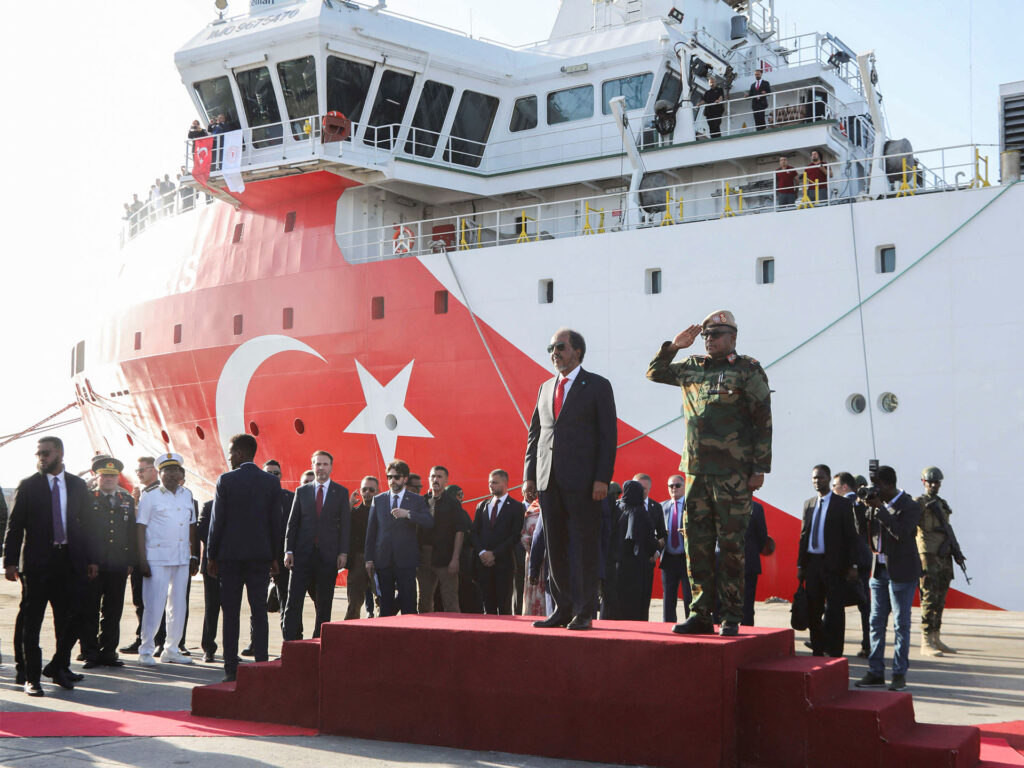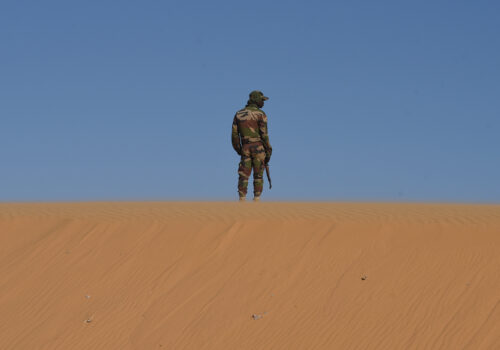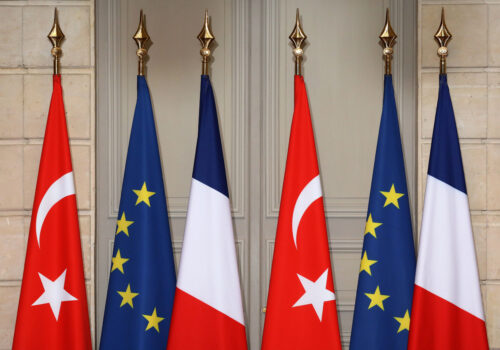With a population projected to reach 2.5 billion by 2050, Africa will inevitably play an increasingly large role in the global economy. From abundant critical mineral and energy resources, an ever-expanding middle-class with growing purchasing power, the largest free trade area in the world measured by the number of countries participating, some of the greatest economic opportunities in the coming decade reside on the African continent.
Despite Africa’s global significance, Western influence on the continent has waned in recent years. A 2024 Gallup report shows that the United States is losing ground on the soft power front to China, which just last year offered Africa $51 billion in funding over the next three years. And following Trump’s “liberation day” tariff announcements, China dropped all tariffs on African imports. Russia’s security influence in Africa is expanding as well, especially in the coup-laden Sahel, and Moscow is deepening its efforts at soft power on the continent, especially through sports. The Trump administration has approached relations with Africa with a trade-not-aid approach, and the 2025 US-Africa Business Summit yielded a record-breaking $2.5 billion in deals and commitments. Even so, the United States could use some help to gain favor in an increasingly complex international stage in which states don’t want to make binary choices between potential allies and where partnerships are based more on interests than ideology.
Though often overlooked as a major player in Africa, Turkey has been actively engaging and expanding its ties on the continent. Just this summer, Gabonese President Brice Clotaire Oligui Nguema, Congolese Prime Minister Anatole Collinet Makosso, and Senegalese Prime Minister Ousmane Sonko made official trips to Turkey and were received by Turkish President Recep Tayyip Erdoğan. And in October, the Turkish president will travel to Senegal, where Turkey has built the Dakar Arena, the Abdoulaye-Wade Stadium, and the Cap-des-Biches power plant.
As Turkey continues to develop closer ties to African nations, the United States and Europe should work with Turkey as a partner in its efforts to gain soft power throughout the continent and counter Russian and Chinese influence.
Diplomatic and cultural ties between Turkey and Africa
Turkey’s relationship with Africa is a special one, unencumbered by the colonial baggage of Western powers. Turkey presents itself as an alternative to the West and an equal partner to African countries, a model that has been dubbed the “Ankara consensus” in contrast to both the neoliberal and state-led growth models.
For the past decade, Turkey has been growing its presence in Africa on all fronts, with forty-four embassies on the continent. Erdoğan has paid official visits to thirty African countries, more than any other state leader. Turkish Airlines flies to sixty-one destinations in forty-one African countries.
Turkey also has extensive involvement on the continent through aid and cultural projects. The Turkish Cooperation and Coordination Agency has twenty-two offices across Africa that function under a “Turkish-Type Development Cooperation Model.” And the Turkish Maarif Foundation operates 175 Turkish-curriculum schools across twenty-five African countries. All these developments point to growing Turkish soft power on the continent.
Turkey’s defense cooperation in Sub-Saharan Africa
Turkey also has a significant military presence in Africa. Some two thousand Turkish soldiers are stationed at Turkey’s military base in Mogadishu and the Turkish Navy patrols the Horn of Africa. Turkey is also well-versed in navigating regional disputes. In December 2024, Turkey brokered the Ankara Declaration between Somalia and Ethiopia in an effort assuage concerns over sovereignty and maritime port access that arose over the Somaliland port disagreement between the two countries. This year, Turkey has even started to build a space base in Somalia.
Turkey also contributes to United Nations (UN) peacekeeping missions in Sub-Saharan Africa. These include the UN Transitional Assistance Mission in Somalia, the UN Multidimensional Integrated Stabilization Mission in the Central African Republic, the UN Organization Mission in the Democratic Republic of Congo, the UN Interim Security Force for Abyei (a disputed area between Sudan and South Sudan), the UN Mission in South Sudan, and the UN International Support Mission to Mali. Additionally, twenty-two Sub-Saharan countries have signed security agreements with Turkey.
As Turkey’s defense sector evolves, Turkish defense companies have also turned their attention to Africa. While still a relatively small arms supplier for Africa, Turkey’s influence is growing. In 2021, Turkey exported $328 million worth of arms to Africa, and in 2024, Turkey was the fourth-biggest arms supplier to West Africa, accounting for 11 percent of the region’s imports. Turkish unmanned aerial vehicles are especially popular in Africa due to their relatively low cost. Ten Sub-Saharan countries have ordered or are currently using Turkish Baykar drones. Most recently, Kenya acquired six TB2 unmanned combat aerial vehicles in late 2024.
Turkish investments in Africa
While Turkey has signed free trade agreements with only four African countries—Tunisia, Morocco, Egypt, and Mauritius—Turkish businesses have been expanding in Africa over the past two decades. Turkey-Africa trade volume has grown from $5.4 billion in 2003 to $37 billion in 2024 and Turkey aims to raise this to $50 billion in 2025.
Turkish companies are especially active in construction and infrastructure in Africa. In the first half of this year, 17.9 percent of all international contracts awarded to Turkish construction firms in the came from Africa, valued at a total of $97 billion.
Turkey’s energy demand is currently 74 percent import dependent. Due to high energy bills, Turkey has turned to the African energy market as a cheaper alternative to regional suppliers. Through energy projects across Africa, Turkey aims to both diversify its supply and enhance its long-term energy security.
Turkey first struck energy deals with Nigeria in 1995 and with Algeria in 1998, diversifying Turkey’s natural gas imports. Turkey also signed a mineral exploration deal in Niger in September 2020. In 2024, the Turkish Petroleum Corporation signed a deal with Somalia on onshore hydrocarbon exploration, as well as an agreement to launch oil and gas exploration activities in Libya. In late 2024, Turkey signed a cooperation agreement with Senegal covering oil and gas exploration, production, and trade.
An alignment of alternatives
In the past several years, Turkey has expanded its footprint on the continent across sectors, from people-to-people ties, economic agreements, and security cooperation. As the West looks for likeminded allies to partner with on counterterrorism operations, strategic investments, and on-the-ground expertise, Turkey has much to offer. Not only are Turkey and the United States NATO allies, but following enhanced cooperation in Syria and Ukraine, the growing momentum behind their bilateral relations can help grease the wheels for cooperation in Africa.
For African nations, a core measure of success when it comes to foreign investment is local development. Creating jobs and raising domestic revenue are the top priorities for African countries in business and investment negotiations. The combination of increasing US interest in African goods and materials and Turkey’s presence on the ground creates an opportunity to counter China’s economic influence and security engagements on the continent. For African nations, more potential partners mean better potential deals and greater negotiating power.
To be sure, efforts to develop cooperation between Turkey and the West in Africa to its full potential will face challenges. The expansion of Turkish influence can rub up against established Western interests, as highlighted by disputes between Turkey and France over their policies toward Libya, Mali, and the Horn of Africa. Nevertheless, as Turkey continues to invest in and engage with the continent, its presence in Africa offers opportunities for collaboration.
It is therefore worthwhile for Africa watchers, both in Europe and the United States, to take note of Turkey’s diplomatic successes and growing footprint on the continent. US and European policymakers can help advance cooperation with Turkey on the continent in the following ways:
- Identify Africa’s most pressing needs by offering joint initiatives on social infrastructure, such as housing, hospitals, schools.
- Support African goals on global governance, such as establishing permanent African seats at the UN Security Council and strengthening Africa’s voting in Bretton Woods institutions.
- Incentivize joint initiatives on critical minerals and energy between Turkey and institutions such as the Export-Import Bank, the US International Development Finance Corporation, and the European Bank for Reconstruction and Development.
- Establish a multilateral business organization that will enable business interaction and networking between parties.
- Encourage academic exchange and technology transfers by funding projects and universities that involve Turkish, US, European, and African universities.
Defne Arslan is the senior director and founder of Atlantic Council Turkey Program, leading the Council’s global work and programming on Turkey.
Rama Yade is the senior director of the Atlantic Council’s Africa Center.
About the centers

The Africa Center works to promote dynamic geopolitical partnerships with African states and to redirect US and European policy priorities toward strengthening security and bolstering economic growth and prosperity on the continent.

The Atlantic Council Turkey Program aims to promote and strengthen transatlantic engagement with the region by providing a high-level forum and pursuing programming to address the most important issues on energy, economics, security, and defense.
Further reading
Wed, Jul 23, 2025
The Sahel is pivoting toward Turkey. Here’s what that means for Washington.
AfricaSource By
Washington will need to consider partnering with Turkey when it advances US interests—but it must approach any cooperation with clear eyes.
Mon, Aug 11, 2025
How Turkey’s strategic ambiguity became an advantage in a multipolar world
TURKEYSource By
In a unpredictable international system, Turkey’s ability to maintain ties across divides and rivalries has become its greatest asset.
Tue, Jul 22, 2025
How France and Turkey can renew their ties in a shifting strategic order
TURKEYSource By
Both Paris and Ankara share incentives to pursue a more pragmatic and structured partnership.
Image: Somali President Hassan Sheikh Mohamud looks on as Somali Chief of Defence Force General Ibrahim Sheikh Muhyadin Addow salutes, after the Turkish seismic research vessel Oruc Reis docked at the Sea Port of Mogadishu, Somalia, October 25, 2024. REUTERS/Feisal Omar.



